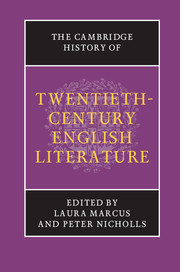Book contents
- Frontmatter
- Introduction
- PART ONE WRITING MODERNITY
- PART TWO THE EMERGING AVANT-GARDE
- PART THREE MODERNISM AND ITS AFTERMATH, 1918–1945
- PART FOUR POST-WAR CULTURES, 1945–1970
- PART FIVE TOWARDS THE MILLENNIUM, 1970–2000
- 32 The Seventies and the cult of culture
- 33 Feminism and writing: the politics of culture
- 34 The half-lives of literary fictions: genre fictions in the late twentieth century
- 35 Theatre and politics
- 36 Irish literature: tradition and modernity
- 37 Scottish literature: Second Renaissance
- 38 Towards devolution: new Welsh writing
- 39 British–Jewish Writing and the turn towards diaspora
- 40 Fiction and postmodernity
- 41 Postcolonial fictions
- 42 Writing lives
- 43 Poetry after 1970
- 44 Ending the century: literature and digital technology
- Bibliography
- Index
- References
42 - Writing lives
from PART FIVE - TOWARDS THE MILLENNIUM, 1970–2000
Published online by Cambridge University Press: 28 March 2008
- Frontmatter
- Introduction
- PART ONE WRITING MODERNITY
- PART TWO THE EMERGING AVANT-GARDE
- PART THREE MODERNISM AND ITS AFTERMATH, 1918–1945
- PART FOUR POST-WAR CULTURES, 1945–1970
- PART FIVE TOWARDS THE MILLENNIUM, 1970–2000
- 32 The Seventies and the cult of culture
- 33 Feminism and writing: the politics of culture
- 34 The half-lives of literary fictions: genre fictions in the late twentieth century
- 35 Theatre and politics
- 36 Irish literature: tradition and modernity
- 37 Scottish literature: Second Renaissance
- 38 Towards devolution: new Welsh writing
- 39 British–Jewish Writing and the turn towards diaspora
- 40 Fiction and postmodernity
- 41 Postcolonial fictions
- 42 Writing lives
- 43 Poetry after 1970
- 44 Ending the century: literature and digital technology
- Bibliography
- Index
- References
Summary
Personality-culture
Biography and autobiography have flourished in the last thirty years of the twentieth century. Both are stacked high in book shops and are among the books most borrowed from the public library. A glance at a current list of bestselling non-fiction reveals that six out often hardback bestsellers and eight out often paperback are either biography or autobiography. ‘Celebrity’ lives abound – the autobiographies of reformed villains and alcoholic footballers, rags to riches tales of pop stars or the scandalous accounts of high society (Andrew Morton’s biography of the Princess of Wales, Diana.: Her True Story sold millions worldwide after its publication in 1992); equally popular, however, are the painstakingly researched and weighty lives of writers and artists, scientists and politicians – ‘literary biographies’ – which together with the ‘literary memoir’ form part of what publishers now call ‘literary non-fiction’, a more elevated mix of specialist subject and trade publisher (among the surprise successes was Stella Tillyard’s Aristocrats,published in 1994, which followed the lives of the four Lennox sisters in late eighteenth-century England and Ireland, and Claire Tomalin’s Samuel Pepys: The Unequalled Self,which won the Whitbread Prize in 2001, and was a bestseller).
Not surprisingly, biographers are the first to claim the supremacy of their own sphere. Indeed, according to one of its main practitioners, Richard Holmes, literary biography is ‘arguably the most successful, and intellectually stimulating, literary form which has held a general readership in Britain’ since the 19605.
- Type
- Chapter
- Information
- The Cambridge History of Twentieth-Century English Literature , pp. 751 - 767Publisher: Cambridge University PressPrint publication year: 2005

